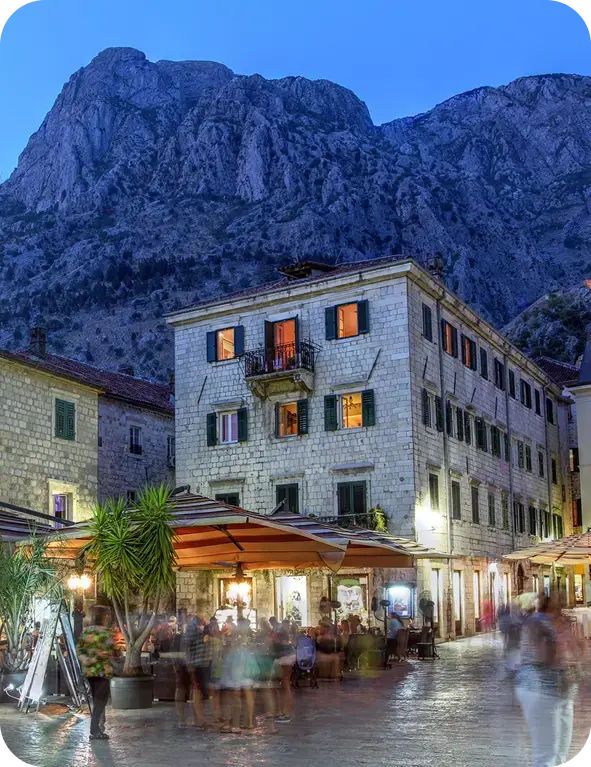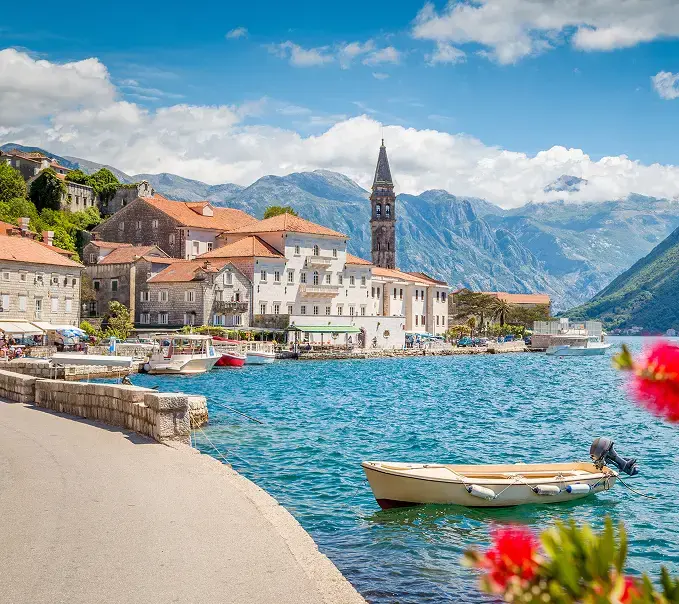Population
GDP (per capital)
Visa-Free Countries
GDP (purchasing power parity)
-
Immigration to Montenegro Through Investment
-
Montenegro is an increasingly appealing destination for investors in Southeast Europe. Located on the Adriatic coast, it offers strategic access to Western Europe and the Balkans. Its EU membership prospects boost economic integration, while its rich culture, natural beauty, and relaxed Mediterranean lifestyle make it an attractive place to invest and live.
- Main Industries
- Tourism and Hospitality
- Agriculture and Farming
- Aluminum and Metal Production
- Energy and Hydropower
- Forestry and Wood Processing
- Construction and Real Estate
- Fishing and Aquaculture
- Retail and Trade Services

UTC+1
13,812 km2
Euro
Podgorica
Montenegrin (official)
Serbian, Albanian, Croatian, Bosnian

-
Legal Framework and Recent Developments
-
Montenegro has updated its immigration policies to regulate foreign investment and residency.
-
The legal framework provides clear pathways for investors to obtain residence permits through financial contributions.
-
Investment options include real estate purchases and business establishment, which contribute to the national economy.
-
1. Closure of the Citizenship-by-Investment Program (CBI)
- The CBI program was officially terminated on December 31, 2022.
- Closure was largely due to pressure from the European Union and concerns over program misuse.
- This decision aligns with Montenegro’s ambitions for European Union membership and adherence to international standards.
-
2. Current Residency Options for Investors
-
Foreign investors can apply for temporary residence permits by:
1- Purchasing qualifying real estate.
2- Establishing or investing in businesses that generate employment. - After five consecutive years of temporary residency, investors may apply for permanent residency.
- Permanent residency may lead to citizenship if all legal requirements are met.
-
3. Legislative Updates in 2025
- No significant changes have been introduced to investor residency or economic migration policies in 2025.
- The existing laws continue to support foreign investment while maintaining regulatory stability.
- Investors are advised to stay updated on any future legislative developments that might affect immigration procedures.

Investment-Based Residence Options in Montenegro (2025)
Investment-Based Residence Options in Montenegro (2025)
Montenegro offers two primary avenues for foreign nationals seeking residency through investment: real estate acquisition and business establishment. Each pathway provides distinct benefits and requirements tailored to different investor profiles.
A. Real Estate Investment
Investing in real estate is a straightforward method for obtaining temporary residence in Montenegro. This approach is particularly appealing for those interested in owning property in a country with a burgeoning real estate market.
Key Criteria:
- Investment Amount: There is no minimum investment requirement for property purchases. However, properties in prime locations may offer better long-term value.
- Eligible Properties: Both residential and commercial properties qualify. Investors should ensure the property is not located in restricted zones, such as agricultural land or areas of national significance.
- Ownership Rights: Foreigners have the same rights as locals to purchase property, with the exception of certain restricted areas. Proof of ownership is required for residency applications.
- Renewability: Temporary residence permits are initially valid for one year and can be renewed indefinitely, provided the property remains under ownership.
- Path to Permanent Residence: After five consecutive years of legal residence, investors may apply for permanent residency, contingent upon meeting all legal requirements.
B. Business Establishment
Establishing a business in Montenegro not only facilitates residency but also offers opportunities to engage in the local economy. This route is ideal for entrepreneurs and professionals aiming to contribute to Montenegro's economic development.
Key Criteria:
- Company Formation: Investors must create and register a legal entity in Montenegro. The process is relatively straightforward and can be completed within a few weeks.
- Capital Requirements: The minimum authorized capital for a limited liability company is €1. However, a higher capital investment may be necessary depending on the business's nature and scope.
- Employment of Locals: While there is no mandatory requirement to hire local employees, creating job opportunities can enhance the business's contribution to the local economy.
- Tax Advantages: Montenegro offers a favorable tax regime, including a corporate tax rate ranging from 9% to 15%, making it an attractive destination for business operations.
- Work Permit: As a company director, investors are eligible for a work permit, allowing them to legally work in Montenegro.
- Renewability: Temporary residence permits are valid for one year and can be renewed annually, provided the business remains operational and compliant with local regulations.
- Path to Permanent Residence: Similar to the real estate route, investors can apply for permanent residency after five consecutive years of legal residence, subject to meeting all necessary criteria.
Both real estate and business investments offer viable residency routes in Montenegro. The choice depends on whether you prefer property ownership or engaging in the local economy. Consulting legal and financial experts is recommended to ensure smooth compliance.
-
Taxation and Financial Considerations
- Navigating the financial landscape is essential for any investment. Montenegro’s clear and competitive tax system helps investors manage obligations effectively while enjoying a supportive economy. Here’s a brief overview of key tax and financial aspects for 2025.
Montenegro’s Tax System for Investors
Personal Income Tax:
A flat rate of 9%, providing simplicity and predictability for individual taxpayers.
Corporate Tax
A uniform 9% tax rate on corporate profits, designed to encourage business development and investment.
Capital Gains Tax
Generally taxed at 9%, allowing for efficient management of investment returns.
-
Double Taxation Treaties
- Montenegro has entered into agreements with over 40 countries.
- These treaties prevent the same income or capital from being taxed twice.
- They facilitate smoother cross-border transactions and investments.
-
Banking and Financial Transparency
- The country adheres to international standards in banking regulations.
- Financial institutions implement rigorous anti-money laundering (AML) and know-your-customer (KYC) procedures.
- These measures protect investor assets and reinforce Montenegro’s reputation as a transparent and trustworthy financial center.
Residency Process for Investors in Montenegro (2025)
Residency Process for Investors in Montenegro (2025)
Montenegro provides foreign investors with clear routes to temporary residence via real estate or business investment. Here’s a concise guide to the application, documents, fees, timelines, and renewals.
Application Procedure (Step-by-Step)
- Choose an Investment Route: Decide between purchasing real estate or establishing a business in Montenegro.
- Prepare Necessary Documentation: Gather all required documents, including proof of investment.
- Submit Application: Apply for a temporary residence permit at the Ministry of Internal Affairs.
- Attend Biometrics Appointment: Visit Montenegro to provide biometric data.
- Await Decision: The Ministry will process your application and notify you of the decision.
- Receive Residence Permit: Upon approval, you will be issued a temporary residence permit.
Required Documentation
- Valid Passport: Proof of identity and nationality.
- Clean Criminal Record: From both Montenegro and your home country.
- Proof of Investment: Documentation of your real estate purchase or business establishment.
- Proof of Accommodation: Rental agreement or property ownership documents.
- Health Insurance: Valid coverage for the duration of your stay.
- Proof of Funds: Demonstrating sufficient means of subsistence.
- Marriage/Birth Certificates: For accompanying family members, if applicable.
- Educational Qualifications: Diplomas or certificates, if required.
Note: All documents must be translated into Montenegrin and, where applicable, apostilled.
Fees
- Government Fees: Approximately €15,000 for the main applicant.
- Legal and Notary Fees: Varies based on service providers.
- Registration Fees: Around €500 for property registration.
- Due Diligence Fees: €7,000 for the main applicant; additional fees for family members may apply.
- Investment Amount: €250,000–€450,000, depending on the investment route and property location.
Timeline
- Real Estate Investment: Application processing typically takes 1–2 months.
- Business Establishment: Company registration can be completed within 2–4 weeks; residence permit issuance may take an additional 1–2 months.
- Total Estimated Time: Generally, 2–3 months from application submission to residence permit issuance.
Renewals and Path to Permanent Residence
- Temporary Residence: Initially valid for one year; renewable annually.
- Permanent Residence: After five consecutive years of legal residence, investors may apply for permanent residency.
- Citizenship: Following an additional five years of permanent residency (totaling ten years), individuals may apply for Montenegrin citizenship, subject to meeting all legal requirements.
-
Path to Permanent Residence and Citizenship
-
Montenegro offers structured pathways to permanent residency and citizenship, catering to various applicants, including investors, professionals, and families. Below is an overview of the processes, requirements, and timelines:
-
Citizenship by Investment
- Program Status: The Montenegro Citizenship by Investment Program was concluded on 31 December 2022.
- Previous Requirements: Applicants were required to make a defined economic contribution to Montenegrin society through an investment in an approved development project and a capital contribution to a fund designated by the government.
- Dual Citizenship Exemption: Successful applicants under this program were exempt from the country's restrictions on dual citizenship.

-
Benefits and Risks
-
Investing in Montenegro presents a compelling opportunity for those seeking a blend of lifestyle appeal, tax efficiency, and strategic access to European markets. However, as with any investment, it's essential to weigh the advantages against potential challenges to make informed decisions.
-
Advantages
- Lifestyle Appeal: Montenegro offers a picturesque Adriatic coastline, complemented by a Mediterranean climate and rich cultural heritage. Its low population density and emphasis on environmental preservation contribute to a high quality of life, attracting expatriates and retirees seeking tranquility and natural beauty.
- Tax Efficiency: The country boasts one of Europe's most favorable tax regimes, with a flat personal income tax rate of 9%, corporate tax at 9%, and capital gains tax also at 9%. Additionally, there is no inheritance tax, making it an attractive destination for wealth management.
- Strategic Market Access: Positioned at the crossroads of Eastern and Western Europe, Montenegro serves as a gateway to both the Balkan and broader EU markets. Its anticipated EU membership enhances its appeal for businesses seeking to establish a presence in the region.
-
Risks
- Market Volatility: While Montenegro's real estate sector has experienced growth, it remains susceptible to fluctuations. Overvaluation in certain areas, such as the Bay of Kotor, may pose risks for investors if market dynamics shift.
- Bureaucratic Processes: Despite efforts to streamline procedures, investors may encounter delays in administrative processes. Navigating local regulations and securing necessary permits can be time-consuming, potentially impacting project timelines.
- Policy Uncertainty: Changes in government policies or shifts in the EU accession process could affect the investment climate. While EU membership is anticipated, the timeline remains subject to political developments, which may influence investor confidence.


-
Risk Mitigation Strategies
- Engage Legal Expertise: Consulting with local legal professionals can provide clarity on regulatory requirements, ensuring compliance and minimizing legal risks.
- Partner with Reputable Agents: Collaborating with established real estate agents and investment advisors can offer insights into market trends and assist in identifying sound investment opportunities.
- Diversify Investments: Avoid concentrating investments in a single sector or region. Diversifying across different assets and locations can reduce exposure to localized risks.
- Monitor Policy Developments: Stay informed about political and economic changes within Montenegro and the EU, as these can impact investment landscapes.
Practical Tips for Investors
Practical Tips for Investors
Investing in Montenegro calls for careful preparation and informed choices. To protect your interests, consider the following key points:
Consult Licensed Immigration Lawyers
Working with experienced immigration attorneys ensures your applications comply with local laws and helps avoid costly mistakes.
Choose Reputable Real Estate or Business Opportunities
Focus on projects with clear ownership, solid financials, and a good reputation. Partner with trusted agencies or advisors familiar with the Montenegrin market.
Conduct Thorough Due Diligence
Verify legal status, permits, and contracts before investing. Assess market conditions and potential risks to make well-informed decisions.
Conclusion
Montenegro offers promising investment opportunities paired with a straightforward path to residency and citizenship. By understanding the benefits, risks, and practical steps involved, investors can make well-informed decisions and confidently embark on their journey in this vibrant and growing market.
FAQ about Investment in Montenegro
How long does it take to obtain permanent residence in Montenegro?
Typically, permanent residence can be granted after five years of continuous legal residence in the country.
What are the main tax benefits for investors in Montenegro?
Montenegro offers a flat 9% rate on personal income, corporate profits, and capital gains, along with no inheritance tax, making it fiscally attractive.
Is dual citizenship allowed in Montenegro?
Generally, Montenegro does not permit dual citizenship, although exceptions exist under specific conditions such as prior dual nationality or special government approval.
What precautions should investors take before committing funds?
Investors should consult licensed lawyers, verify project legitimacy, and conduct thorough due diligence to mitigate risks and ensure compliance.
Looking for expert visa support?
PROGRAM MATCH
Compare the different programs in a nutshell and discover their features
PROGRAM COST
Check the cost estimates for each offered program
PROGRAM MAP
Explore the power of global mobility for every passport in the world
